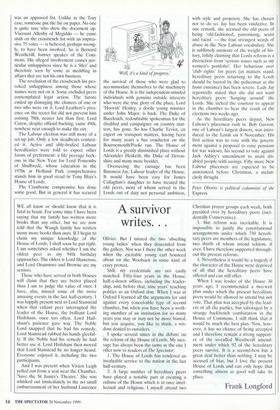A survivor
writes.. .
WE all know or should know that it is fatal to boast. For some time I have been saying that my family has written more books than any other, but we are now told that the Waugh family has written many more books than ours. If I begin to claim my unique knowledge of the House of Lords, I shall soon be put right.
I am sometimes asked whether I am the oldest peer as my 94th birthday approaches. The oldest is Lord Shawcross, and Lord Oranmorc and Browne are my seniors.
Those who have served in both Houses will claim that they are better placed than I am to judge the value of ours. I have, alas, missed some of the more amusing events in the last half-century. I was happily present next to Lord Stanstead when that valiant peer interrupted the leader of the House, the brilliant Lord Hailsham, once too often. Lord Hail- sham's patience gave way. The Noble Lord snapped that he had his remedy. Lord Stanstead rubbed his hands gleeful- ly. If the Noble had his remedy he had better use it. Lord Hailsham then moved that Lord Stanstead be no longer heard. Everyone enjoyed it, including the two participants.
And I was present when Vivien Leigh yelled out from a seat near the Chamber, 'Save the St James's Theatre,' She was whisked out immediately to the no small embarrassment of her husband Laurence Olivier. But I missed the two 'abseiling young ladies' when they descended from the gallery. Nor was I there the other week when the excitable young earl bounced about on the Woolsack in some kind of crazy protest.
Still, my credentials are not easily matched. Fifty-four years in the House, half-a-dozen offices, including the leader- ship, and, before that, nine years' teaching politics as an Oxford don. When I was at Oxford I learned all the arguments for and against every conceivable type of second chamber, but when you have been a work- ing member of an institution for so many years you may or may not be more biased, but you acquire, you like to think, a wis- dom denied to outsiders.
I spoke several times in the debate on the reform of the House of Lords. My mes- sage has always been the same as the one I offer now to readers of The Spectator:
1. The House of Lords has rendered an invaluable service to the nation in the last half-century.
2. A large number of hereditary peers have played a notable part in creating a culture of the House which is at once intel- lectual and religious. I myself attend two Christian prayer groups each week, both presided over by hereditary peers (inci- dentally Conservative).
3. But reform was inevitable. It is impossible to justify the constitutional arrangements under which 750 heredi- tary peers are members of the legislature, two thirds of whom attend seldom, if ever. I have therefore supported through- out the present reforms.
4. Nevertheless it would be a tragedy if the character of the House were deprived of all that the hereditary peers have offered and can still offer.
When I was leader of the House 30 years ago, I recommended a two-writ plan under which the present hereditary peers would be allowed to attend but not vote. That plan was accepted by the lead- ers of all the parties, but sabotaged by a strange backbench combination in the House of Commons. I still think that it would be much the best plan. Now, how- ever, it has no chance of being accepted and I therefore remain a strong support- er of the so-called Weatherill amend- ment under which 92 of the hereditary peers survive. It is a second-best but a great deal better than nothing. T may be accused of bias, but I love the present House of Lords and can only hope that something almost as good will take its place.
Frank Longford


























































































 Previous page
Previous page